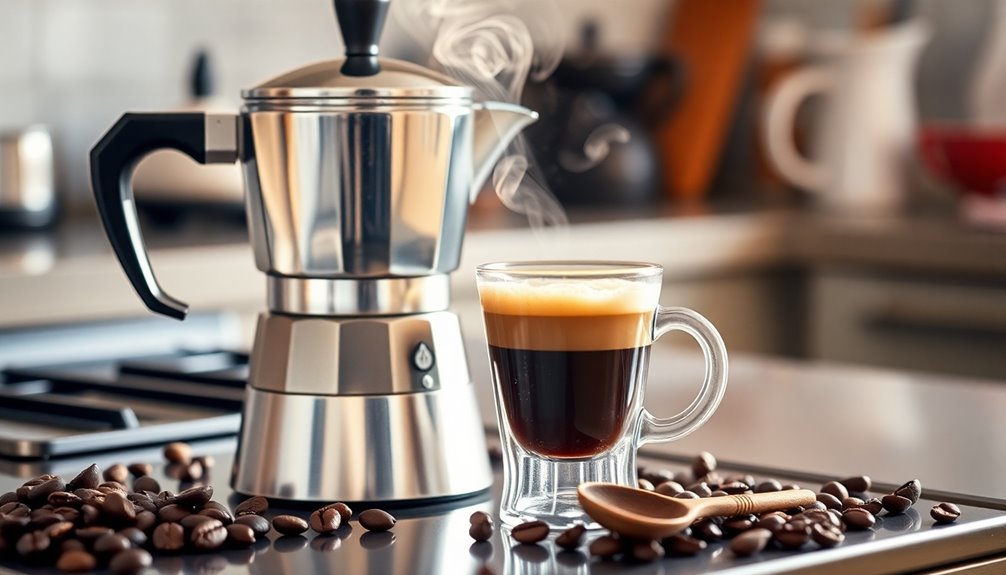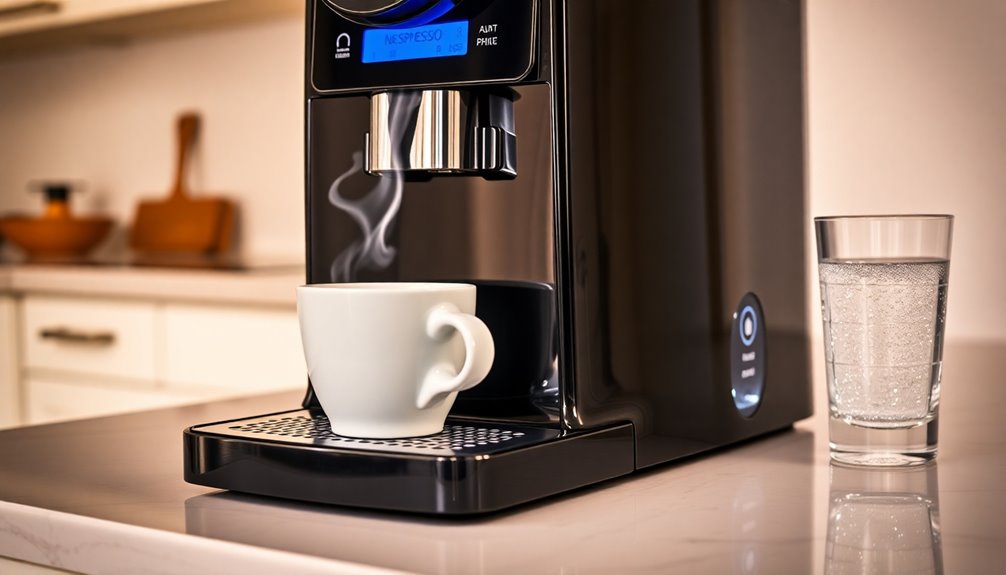A typical cup of masala chai has around 40 mg of caffeine, which is a gentler option compared to a standard cup of coffee that usually contains about 120 mg. If you opt for a chai latte, the caffeine can range from 25 to 55 mg, depending on how it's prepared. You might also come across caffeine-free options like rooibos chai, which retains the spiced experience without the jitters. So, whether you need a mild boost or want to enjoy chai late in the day, there's a perfect option for you. Stick around to discover more about chai and its variations!
Key Takeaways
- Traditional masala chai contains approximately 40 mg of caffeine per cup.
- Chai lattes have caffeine levels ranging from 25 to 55 mg, depending on preparation methods.
- Prana Chai can vary from 20 to 100 mg of caffeine per cup based on how it's made.
- Rooibos chai is caffeine-free, making it suitable for those sensitive to caffeine.
- Caffeine absorption in chai is slowed by tannins, offering a more sustained energy release compared to coffee.
Understanding Chai and Its Variants
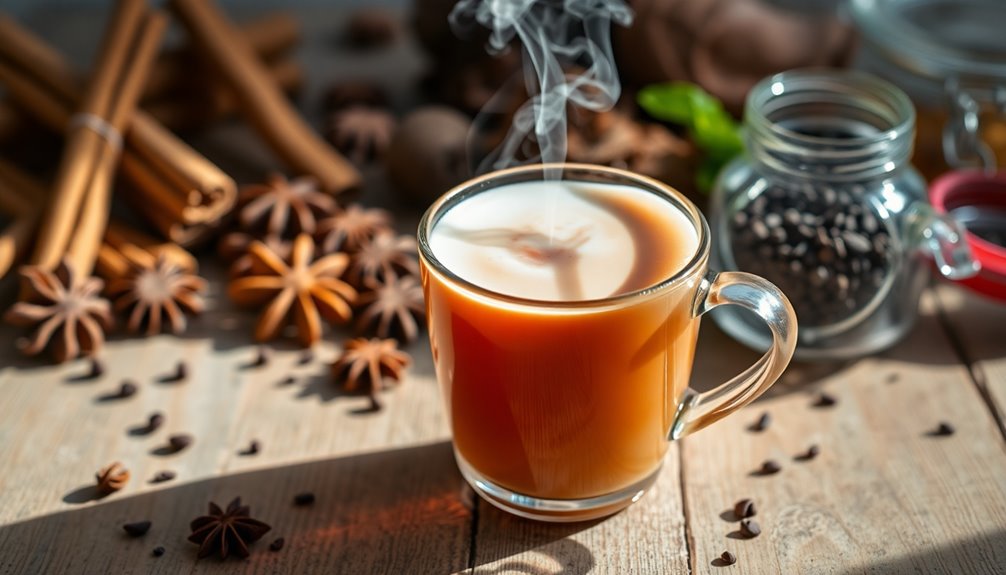
When you plunge into the world of chai, you'll discover that it's more than just tea; it's a rich blend of black tea and various spices that create a unique flavor profile.
Traditional masala chai combines black tea with spices like cardamom and ginger, offering not only a delightful taste but also health benefits, such as improved digestion.
If you prefer something sweeter, a chai latte adds creaminess, though it can alter caffeine levels due to added milk.
For those sensitive to caffeine, Rooibos chai provides a caffeine-free alternative while still delivering that spiced experience.
Each variant reflects the versatility of chai, making it a beloved choice for tea lovers everywhere.
Enjoy exploring these delicious options!
Caffeine Content in Chai Tea
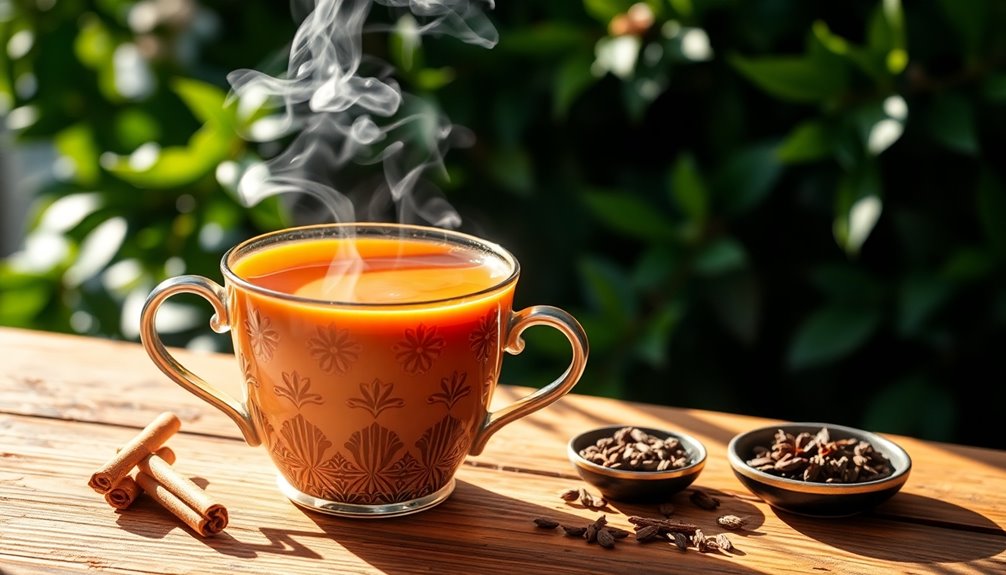
Chai tea offers a delightful blend of flavors, but if you're curious about its caffeine content, you'll find it varies quite a bit.
A typical cup of chai tea contains around 40mg of caffeine, which is considerably lower than the average cup of coffee at about 120mg. Your caffeine levels can fluctuate based on preparation methods; for instance, Prana Chai can range from 20 to 100mg per cup.
The steeping time also plays a role, as longer steeps can reduce caffeine content by up to 80%. If you're looking for a caffeine-free alternative, consider rooibos chai, perfect for evening enjoyment.
Comparison With Coffee
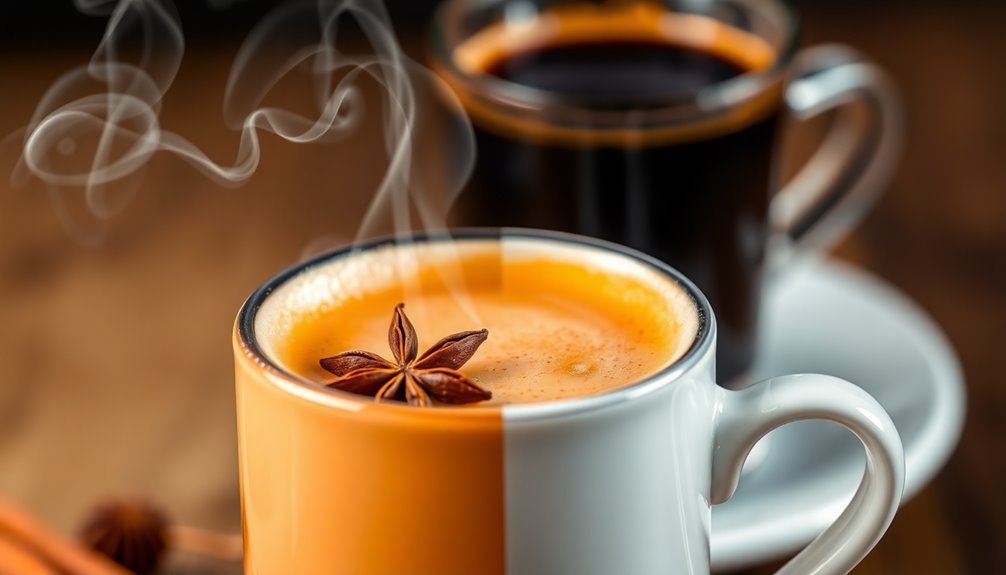
While many people turn to coffee for a quick boost, chai tea offers a gentler alternative that still provides a caffeine lift. A typical cup of chai contains about 40mg of caffeine, considerably lower than the 120mg you'd find in an average cup of coffee.
This lower caffeine content makes chai a great option for those looking for a milder stimulant. In comparison with coffee, chai's caffeine is absorbed more slowly due to tannins, promoting sustained mental focus without the jitters.
Plus, you can enjoy chai tea prepared in the evening without disturbing sleep, while coffee might keep you awake. So, if you're seeking a calming caffeine experience, chai tea is definitely worth considering.
Health Benefits of Chai
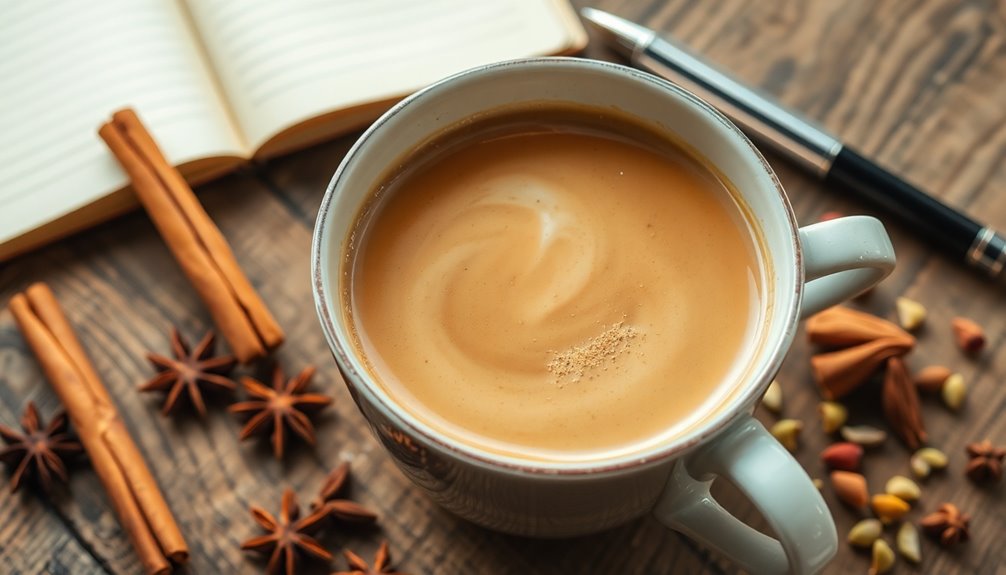
Many people may not realize that chai tea comes packed with health benefits beyond its delightful flavor. The tea polyphenols in chai enhance cognitive focus and calm the nervous system, helping you stay attentive.
The spices like ginger and cardamom support digestive health and reduce inflammation. Additionally, chai tea contributes to cardiovascular health by potentially lowering cholesterol and blood pressure levels.
Its antioxidants may also offer protective effects against neurodegenerative diseases, combating oxidative stress in the brain. Plus, the tannins in chai slow the absorption of caffeine in tea, providing a more sustained energy boost than coffee. Regular consumption of chai may promote overall emotional well-being through the release of neurotransmitters that enhance mood and reduce stress.
Preparation Methods for Chai
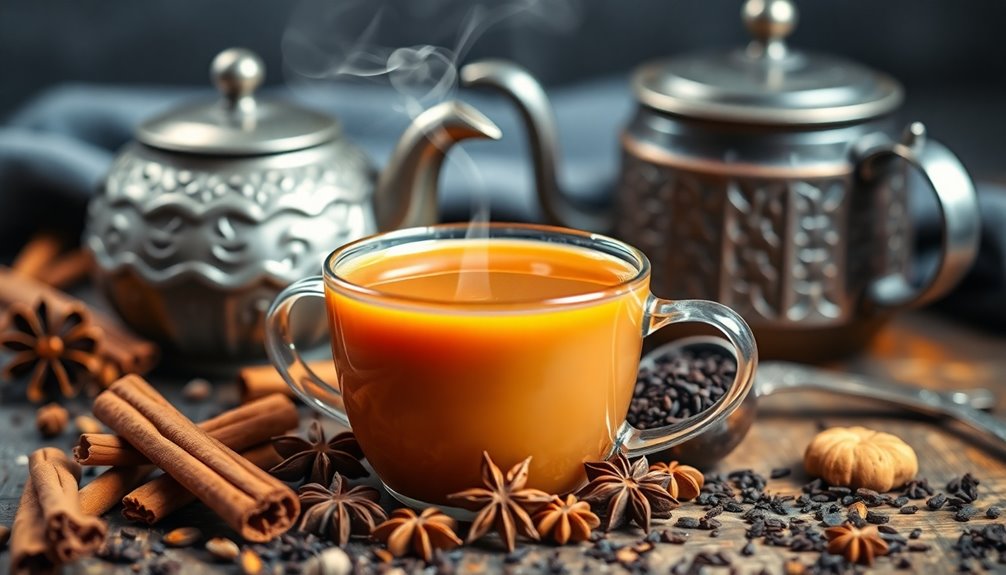
When you're ready to enjoy a comforting cup of chai, the preparation method can make all the difference in flavor and caffeine content.
Traditional chai tea is brewed using black tea and spices like cardamom, cinnamon, and ginger, often combined with milk and sweeteners.
For a quicker option, you might opt for commercial chai concentrates or powdered mixes which offer a faster way to enjoy your drink.
If you prefer loose leaf tea, be prepared for a longer brewing time and the chance to customize your sweetness.
Remember, the steeping time greatly impacts both flavor and caffeine content, with most caffeine being released in the first few minutes of brewing. Additionally, using glass or ceramic vessels for brewing can enhance the overall experience and flavor of your chai.
Enjoy experimenting with these different preparation methods!
Chai Latte and Caffeine Levels
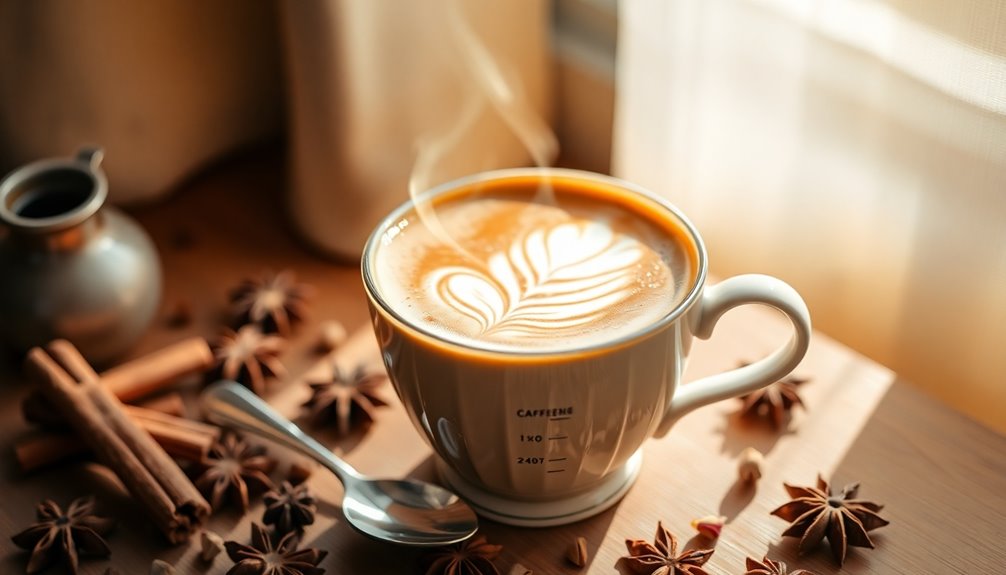
A chai latte can be a delightful way to enjoy the rich flavors of traditional chai, but it's important to be mindful of its caffeine levels.
Typically, a chai latte made from powdered mixes contains about 25 to 55mg of caffeine per cup, while those created from concentrates generally have around 30 to 35mg. The caffeine content varies considerably based on the steeping time and the tea-to-spice ratio used in preparation.
Unlike traditional chai, which has a lower caffeine content of about 40mg per cup, chai lattes often have higher levels due to their concentrated ingredients. Longer steeping times, especially with loose leaf tea, can further increase caffeine release, so keep that in mind when preparing your chai latte. Additionally, high fiber content in chia seeds can provide a sustained energy boost, complementing the caffeine effects in your drink.
Environmental Impact of Chai
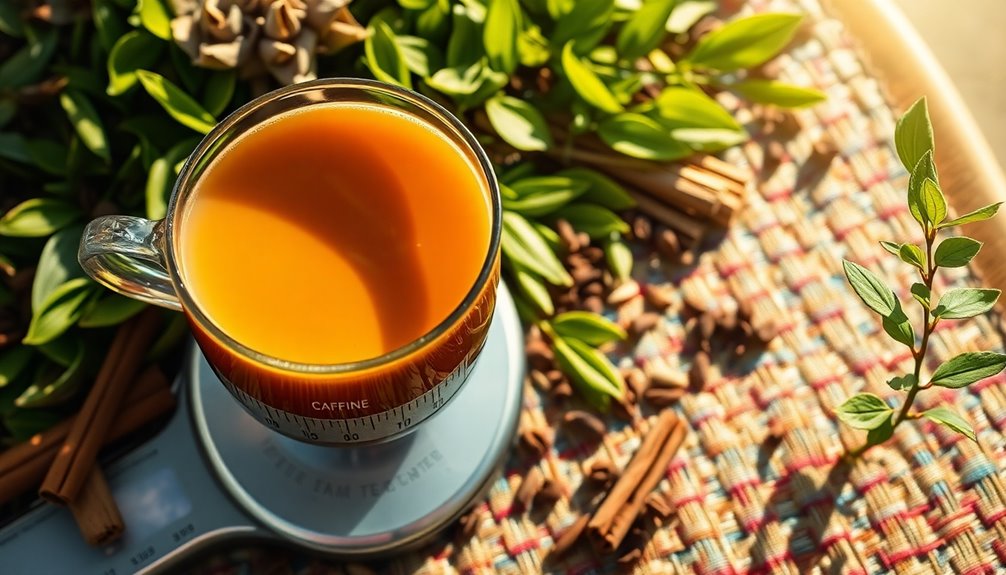
When you choose chai over coffee, you're making a more sustainable choice.
Chai requires considerably less water to produce, highlighting its efficiency in beverage production.
Plus, its cultivation often results in a smaller carbon footprint, offering even more environmental benefits.
Water Usage Comparison
Although many people enjoy their morning coffee, it's important to contemplate the environmental impact of our beverage choices.
When you consider water usage, chai tea emerges as a more sustainable choice. Producing a cup of coffee requires over 1100 cups of water, which highlights its significant water footprint. In contrast, only about one-tenth of that amount is needed for chai production.
This lower water requirement not only makes chai a smarter option but also contributes to environmental conservation efforts. As our water resources become increasingly scarce, opting for chai over coffee helps reduce overall water consumption.
Sustainable Production Practices
While many people enjoy their daily caffeine fix, the sustainable production practices behind chai tea make it a remarkable choice for environmentally conscious consumers.
Chai requires only about a tenth of the water needed for coffee, making its production considerably more sustainable, especially in water-scarce regions. The farming methods used for chai often involve less intensive practices, resulting in reduced environmental degradation.
Many chai products come from Fair Trade certified farms, promoting ethical growing practices and supporting sustainable agriculture. Additionally, essential oils extracted from chai ingredients can enhance relaxation and overall well-being.
Environmental Benefits of Chai
Chai tea offers significant environmental benefits, making it an excellent choice for eco-conscious consumers.
When you compare it to coffee, chai requires far less water—only about 1/10th of what's needed for a cup of coffee. This sustainable production reduces your environmental footprint and promotes responsible resource management, especially important as water scarcity rises.
Additionally, chai cultivation typically uses fewer chemicals, supporting organic practices that contribute to environmental conservation.
By choosing chai over coffee, you're not just enjoying a delicious beverage; you're also making a positive impact on our planet.
Cultural Significance of Chai
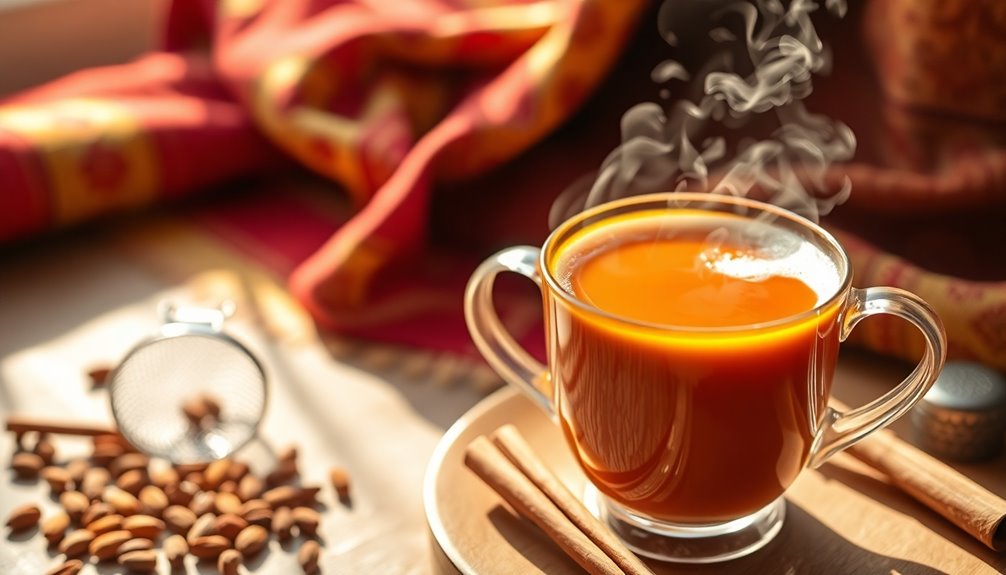
Chai isn't just a drink; it's a symbol of hospitality and warmth that reflects the essence of Indian culture.
When you serve chai to guests, you're participating in a cherished ritual that fosters connection and conversation.
As chai grows in popularity worldwide, it retains its significance while adapting to new tastes and traditions.
Traditional Hospitality Rituals
In Indian culture, serving chai is more than just offering a drink; it's a warm gesture that embodies hospitality and community. This traditional beverage, made with black tea and a blend of spices, plays an essential role in social interactions.
When you prepare chai, you're not just brewing a drink; you're participating in a cultural ritual that invites connection. Each household may have its unique recipe, reflecting regional and familial traditions.
Chai often serves as a conversation starter, welcoming guests and fostering relationships. Whether it's during family gatherings or casual visits with friends, sharing chai symbolizes warmth and togetherness, reinforcing the bonds that tie people together in the vibrant tapestry of Indian life.
Global Popularity Growth
As chai's rich flavors and comforting qualities capture hearts around the globe, its popularity has soared, transforming from an Indian staple into a beloved drink in many cultures.
In India, masala chai reigns supreme, often preferred over coffee and served as a symbol of hospitality.
As chai spreads internationally, variations like the sweeter, creamier chai latte have emerged, especially in U.S. cafes. This global popularity reflects a culinary journey where chai adapts to different tastes while maintaining its cultural significance.
People appreciate not only the diverse flavors but also the health benefits associated with chai, including antioxidants and soothing properties.
Ultimately, chai has become a universal symbol of warmth, community, and connection across cultures.
Symbol of Warmth
Warmth and hospitality are at the heart of chai culture, especially in India, where this beloved beverage is more than just a drink; it's a symbol of connection.
When you serve chai, you're embracing traditions that reflect community and togetherness. It's common for guests to be welcomed with a steaming cup, showcasing the values of hospitality ingrained in Indian society.
The preparation of chai often involves specific rituals that foster social bonding during gatherings, making it an essential part of family events.
As chai travels globally, each culture adds its unique twist while respecting its roots, demonstrating how culinary traditions can create connections across diverse communities.
In every sip, you experience a rich tapestry of warmth and cultural significance.
Exploring Different Chai Options
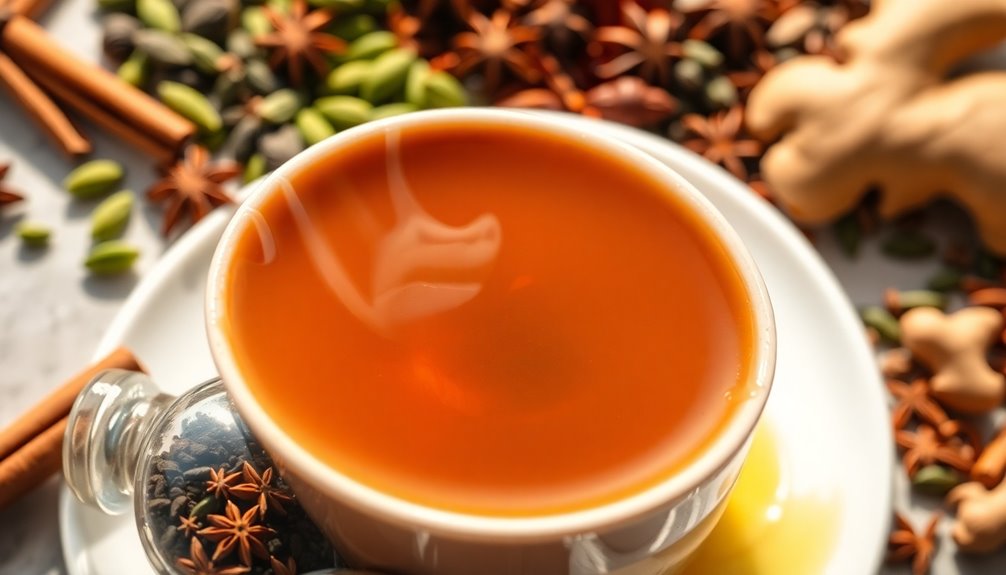
While exploring different chai options, you'll discover a delightful variety of flavors and caffeine levels tailored to your preferences. Here's a quick comparison:
| Chai Type | Caffeine Level (mg) | Notes |
|---|---|---|
| Traditional Masala Chai | 40 | Depends on tea and steeping time |
| Chai Concentrates | 30-35 | Stronger flavor and boost |
| Chai Lattes | 25-55 | Mixes vary in caffeine content |
| Rooibos Chai | 0 | Caffeine-free option |
Whether you enjoy the robust taste of traditional masala chai or prefer a caffeine-free rooibos chai, each option offers a unique experience. Just remember, steeping time can also affect your chai's caffeine extraction! Additionally, the caffeine content in various teas can significantly influence your overall experience and energy levels.
Frequently Asked Questions
How Much Caffeine Is in Chai Tea Vs Coffee?
When you compare chai tea to coffee, you'll notice a significant difference in caffeine content. A typical cup of chai has around 40mg of caffeine, while coffee usually packs about 120mg.
The way you prepare your chai can influence the caffeine levels, with some variations ranging from 20 to 100mg.
Chai's unique combination of tannins helps moderate caffeine absorption, giving you a steadier energy boost compared to the quick hit from coffee.
How Much Caffeine Is in a Starbucks Chai Tea?
When you order a Starbucks Chai Tea, you're looking at about 40mg of caffeine in an 8 oz serving, or around 95mg in a grande Chai Tea Latte.
The caffeine level can vary depending on the chai concentrate used and how it's prepared.
You can even customize your drink, which might change the caffeine content.
This slower release of caffeine offers you a balanced energy boost, unlike the jolt from coffee.
How Much Caffeine Is in a 12 Oz Dirty Chai?
In a 12 oz dirty chai, you can expect the caffeine content to range from 40 to 100 mg.
This variation depends on how strong the black tea is and how much espresso you add. Typically, a shot of espresso contributes around 60 mg of caffeine.
If you steep your tea longer, it might boost the caffeine level too. Different preparation methods can also impact the final amount you get.
Will Chai Tea Keep You Awake?
Ever wondered if your evening chai will keep you awake?
Generally, chai tea won't disrupt your sleep like coffee might. Its caffeine content is lower, and the way it interacts with tannins helps release caffeine slowly, promoting a calm focus. Many people enjoy chai at night without issues.
If you're sensitive to caffeine, consider rooibos chai for a flavorful, caffeine-free option. You can sip and relax without worrying about sleeplessness!
Conclusion
To sum up, chai tea is a deliciously enchanting brew that packs a delightful caffeine punch, rivaling even the strongest coffee! With its rich flavors and cultural significance, chai isn't just a drink; it's an experience that transports you to a bustling Indian market with each sip. So, whether you're seeking a cozy moment or a caffeine boost, chai is your ultimate companion. Embrace the magic of chai and let it elevate your day to extraordinary heights!

